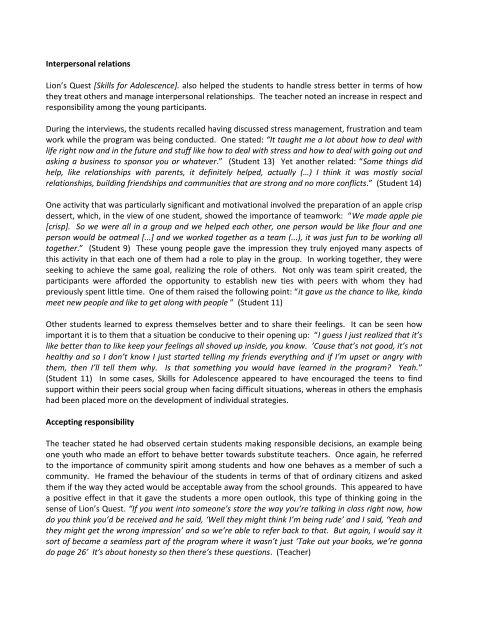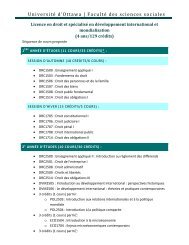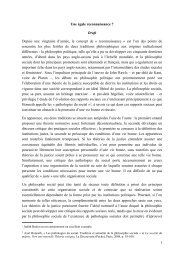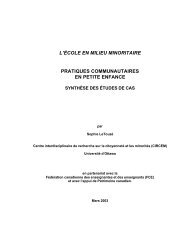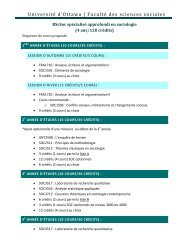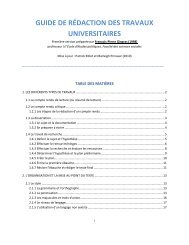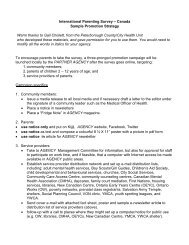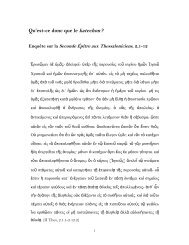Les Clés pour l'adolescence, un programme de promotion de la ...
Les Clés pour l'adolescence, un programme de promotion de la ...
Les Clés pour l'adolescence, un programme de promotion de la ...
Create successful ePaper yourself
Turn your PDF publications into a flip-book with our unique Google optimized e-Paper software.
Interpersonal re<strong>la</strong>tions<br />
Lion’s Quest [Skills for Adolescence]. also helped the stu<strong>de</strong>nts to handle stress better in terms of how<br />
they treat others and manage interpersonal re<strong>la</strong>tionships. The teacher noted an increase in respect and<br />
responsibility among the yo<strong>un</strong>g participants.<br />
During the interviews, the stu<strong>de</strong>nts recalled having discussed stress management, frustration and team<br />
work while the program was being conducted. One stated: “It taught me a lot about how to <strong>de</strong>al with<br />
life right now and in the future and stuff like how to <strong>de</strong>al with stress and how to <strong>de</strong>al with going out and<br />
asking a business to sponsor you or whatever.” (Stu<strong>de</strong>nt 13) Yet another re<strong>la</strong>ted: “Some things did<br />
help, like re<strong>la</strong>tionships with parents, it <strong>de</strong>finitely helped, actually (…) I think it was mostly social<br />
re<strong>la</strong>tionships, building friendships and comm<strong>un</strong>ities that are strong and no more conflicts.” (Stu<strong>de</strong>nt 14)<br />
One activity that was particu<strong>la</strong>rly significant and motivational involved the preparation of an apple crisp<br />
<strong>de</strong>ssert, which, in the view of one stu<strong>de</strong>nt, showed the importance of teamwork: “We ma<strong>de</strong> apple pie<br />
[crisp]. So we were all in a group and we helped each other, one person would be like flour and one<br />
person would be oatmeal [...] and we worked together as a team (...), it was just f<strong>un</strong> to be working all<br />
together.” (Stu<strong>de</strong>nt 9) These yo<strong>un</strong>g people gave the impression they truly enjoyed many aspects of<br />
this activity in that each one of them had a role to p<strong>la</strong>y in the group. In working together, they were<br />
seeking to achieve the same goal, realizing the role of others. Not only was team spirit created, the<br />
participants were affor<strong>de</strong>d the opport<strong>un</strong>ity to establish new ties with peers with whom they had<br />
previously spent little time. One of them raised the following point: “it gave us the chance to like, kinda<br />
meet new people and like to get along with people ” (Stu<strong>de</strong>nt 11)<br />
Other stu<strong>de</strong>nts learned to express themselves better and to share their feelings. It can be seen how<br />
important it is to them that a situation be conducive to their opening up: “I guess I just realized that it’s<br />
like better than to like keep your feelings all shoved up insi<strong>de</strong>, you know. ’Cause that’s not good, it’s not<br />
healthy and so I don’t know I just started telling my friends everything and if I’m upset or angry with<br />
them, then I’ll tell them why. Is that something you would have learned in the program? Yeah.”<br />
(Stu<strong>de</strong>nt 11) In some cases, Skills for Adolescence appeared to have encouraged the teens to find<br />
support within their peers social group when facing difficult situations, whereas in others the emphasis<br />
had been p<strong>la</strong>ced more on the <strong>de</strong>velopment of individual strategies.<br />
Accepting responsibility<br />
The teacher stated he had observed certain stu<strong>de</strong>nts making responsible <strong>de</strong>cisions, an example being<br />
one youth who ma<strong>de</strong> an effort to behave better towards substitute teachers. Once again, he referred<br />
to the importance of comm<strong>un</strong>ity spirit among stu<strong>de</strong>nts and how one behaves as a member of such a<br />
comm<strong>un</strong>ity. He framed the behaviour of the stu<strong>de</strong>nts in terms of that of ordinary citizens and asked<br />
them if the way they acted would be acceptable away from the school gro<strong>un</strong>ds. This appeared to have<br />
a positive effect in that it gave the stu<strong>de</strong>nts a more open outlook, this type of thinking going in the<br />
sense of Lion’s Quest. “If you went into someone’s store the way you’re talking in c<strong>la</strong>ss right now, how<br />
do you think you’d be received and he said, ‘Well they might think I’m being ru<strong>de</strong>’ and I said, ‘Yeah and<br />
they might get the wrong impression’ and so we’re able to refer back to that. But again, I would say it<br />
sort of became a seamless part of the program where it wasn’t just ‘Take out your books, we’re gonna<br />
do page 26’ It’s about honesty so then there’s these questions. (Teacher)


